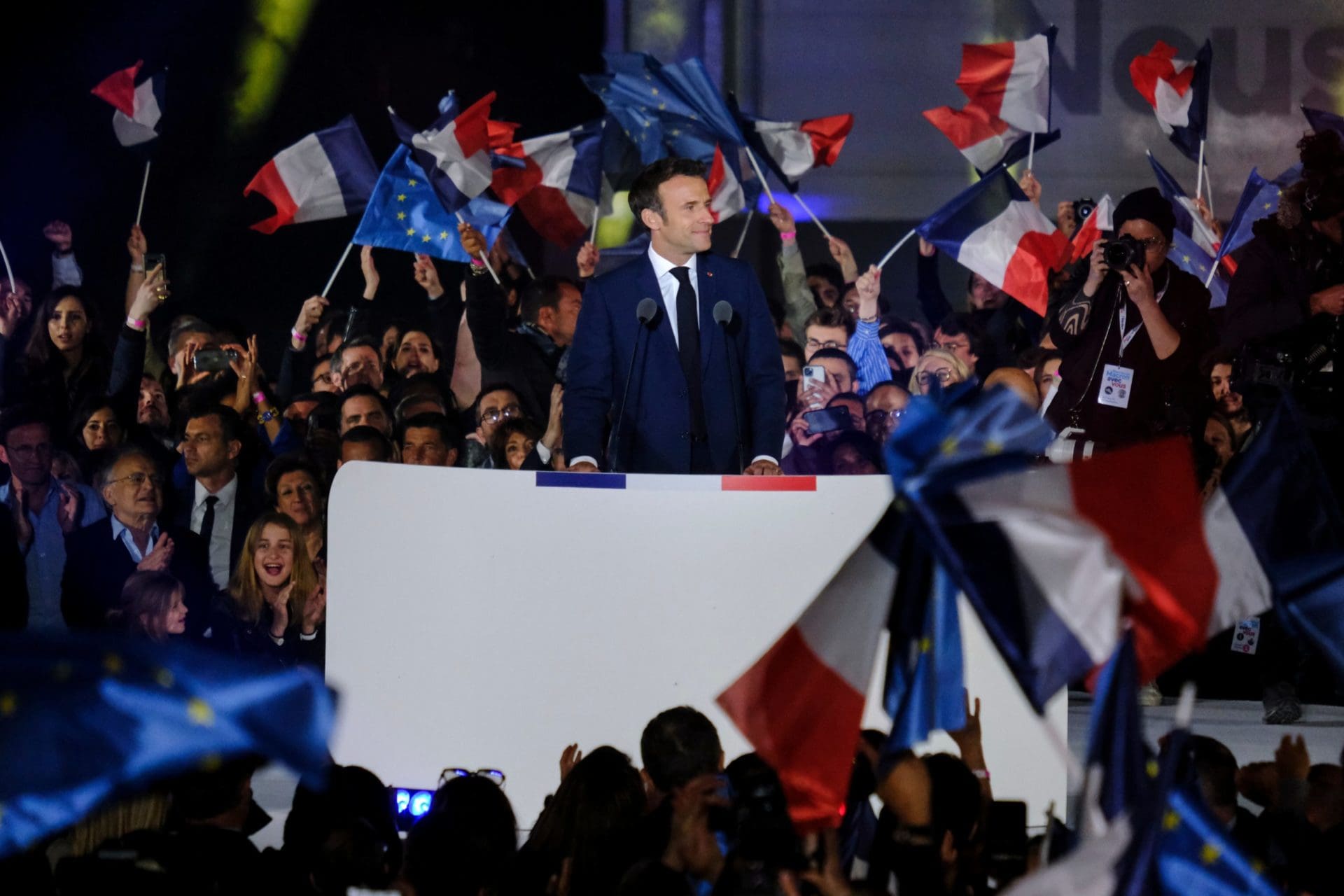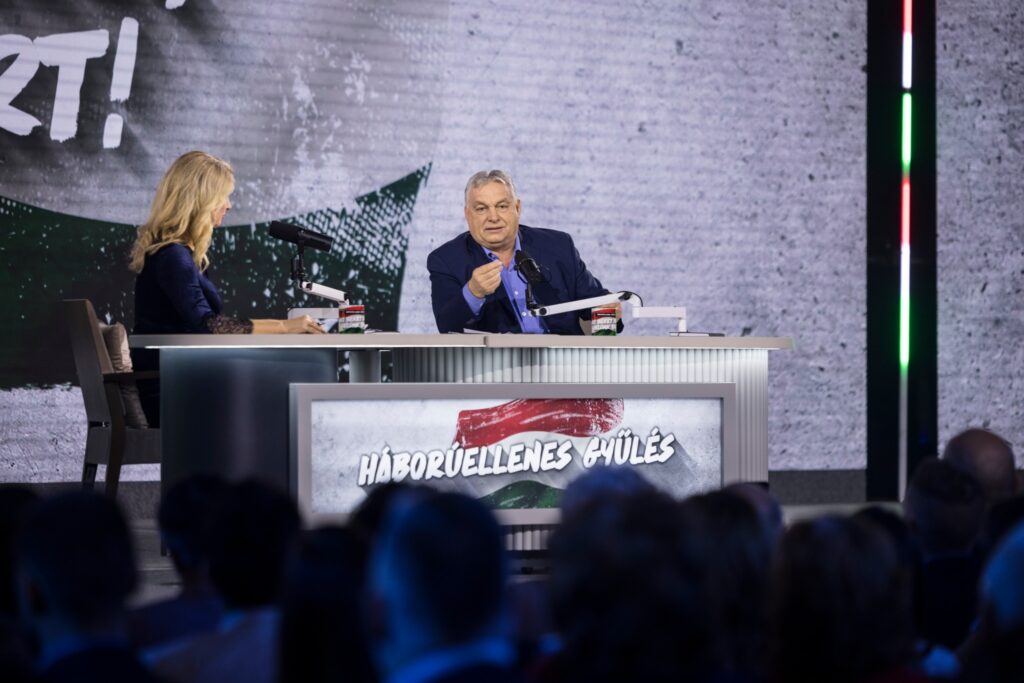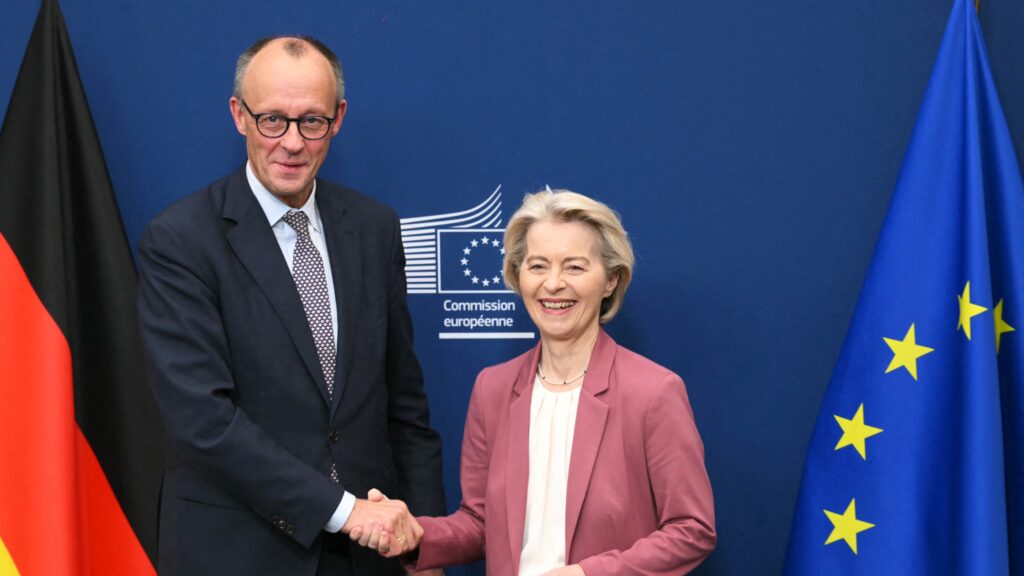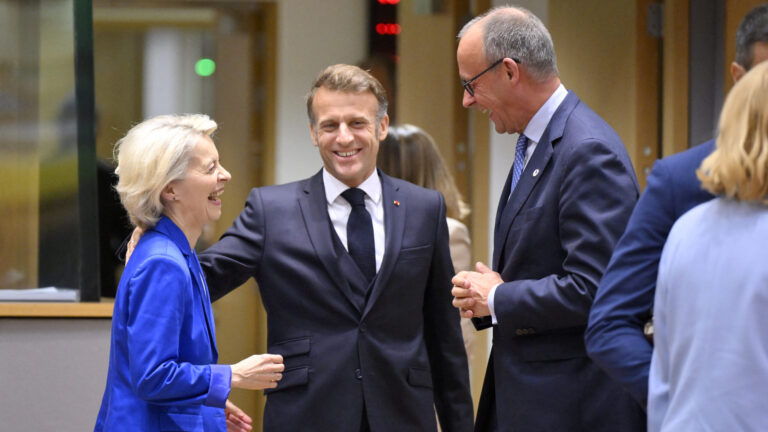Can Europe Take a Step forward in These Troubled Times?
This article from the print magazine was
published before the 2022 National Assembly elections
When Emmanuel Macron founded his movement En Marche ! in the spring of 2016, neither the French nor the European public guessed that by doing so he would trigger a chain of events characterized, at least in part, by the shrinking of the classic centre-right and centre-left into almost complete non-existence and near disappearance from the political spectrum. The Republicans as a party (Les Républicains, LR) who gave France its president between 2007 and 2012 (Nicolas Sarkozy), this time did not even manage to qualify their candidate, Valérie Pécresse,1 who formerly served in several ministerial positions and as government spokesperson, for the second round of the presidential elections in April 2022. Due to the meagre support of less than 5 per cent of the voters she garnered in the first round of the election, she was obliged to pay back the campaign subsidies that had been provided to her by the state.
Socialist candidate Anne Hidalgo, the mayor of Paris, fared even worse: of the twelve nominated candidates, she finished in twelfth place with no more than 1.75 per cent of the votes in the first round. Nor is the Socialists’ precipitous loss of popularity a recent development: former president François Hollande had a rather weak supporter base just months after he took office in 2012, and by the end of his tenure he was the least successful president of the Fifth Republic, with only 4 per cent of voters expressing satisfaction with his performance.2
Enter the ‘Bridgeman’
This was the dominant public mood when Emmanuel Macron, Hollande’s former minister for the economy, industry, and digitalization, made his debut with the movement he founded in April 2016 (almost exactly one year before the 2017 presidential election). The young and ambitious politician brought along a new slogan to hook a growing mass of disappointed voters: he assumed the role of the man who can bridge the abyss between the left and the right. His promise proved so attractive to the French that collecting 66 per cent of the votes in the second round, he became the youngest-ever president of France (and currently also the youngest-ever head of state among G20 leaders). He tried to make his role as ‘bridgeman’ more apparent by inviting former republicans into his government (e.g., Bruno Le Maire, minister of the economy and finance, who also has responsibility for restarting the economy after the pandemic).
It is not by accident that as early as four months after his election he suffered a twenty-per-cent loss of popularity, and managed to stabilize his situation only much later
Macron soon disappointed his voters and was stigmatized as the ‘president of the rich’ right at the beginning of his term, an epithet which he has still failed to fully shake off. The attribute would also be rather difficult to deny, because his remodelling of the wealth tax (ISF3) and reducing of the capital gains tax primarily benefited the wealthiest 10 per cent who tend to keep their assets in bonds, shares, and securities. The middle class was left out of this, and was not eligible for the benefits due for the poorest, either. The latter, however, fared worse, only ‘enjoying’ a growth of benefits of 1–1.5 per cent as a result of Macron’s initial measures. It is not by accident that as early as four months after his election he suffered a twenty-per-cent loss of popularity, and managed to stabilize his situation only much later. A significant part of the voters belonging to this social milieu contributed to Marine Le Pen’s party receiving more than 13 million votes this April. Even though researchers have claimed that Rassemblement National (RN) enjoys the strongest support in smaller towns and villages, indicators of popularity have shown that it is also breathing down Emmanuel Macron’s neck in cities (with the exception of cities over 100,000 inhabitants and the greater Paris area):4 59 per cent of those who need to tighten their belts at the end of each month voted for Marine Le Pen, for a change of president, and 41 per cent of them expressed their support for Macron’s project. In small villages, however, such as Saint-Saveur in Gironde, near Bordeaux, two thirds of the population put their faith in the radical right and voted for Le Pen. Although Macron’s plan to increase the retirement age does not affect the elderly (which is why the greatest number of voters in this age group are behind him), they do not approve the way he has been governing the country at all, making bitter remarks about how much they hope that those who voted for Macron to stay in power will be allowed to retire only at the age of seventy.5
Among the two hundred inhabitants of Mérenville, a village just outside the greater Paris area, Marine Le Pen garnered 73 per cent of the votes in the second round, while the overwhelming majority voted for Jean- Luc Mélenchon in the first round. Since the cost of heating, rent, and the weekly trip to the supermarket are a big headache for most people in the village, who are living from one day to the next, they did not want to see another Macron term. They feel that those in power have failed to address their problems, and it is only Le Pen who has had the courage to declare that foreigners have not done anything to receive funds from the social welfare system, yet they still get more money than the locals. In fact, while the locals have been living where they do for forty or fifty years, their situation is more than disappointing.

Multiple Challenges in the New Term
It is evident from the above that France is a deeply divided country. The first round of the presidential election made it clear that three strong blocks were formed in recent years in French politics: Macron’s pro-Europe ‘centrists’, Le Pen’s national patriots, andMélenchon’s hard left. Each enjoys the support of roughly one third of the voters. The common trait of the far left and the radical right is their strong opposition to the president himself and the establishment, and the stubborn resistance of close to two thirds of the voters makes it difficult for Macron to implement his policies, and will certainly make governing a challenging task.
The National Assembly elections, which are due in a few weeks’ time,6 can be regarded as the unofficial third round of the presidential election. Although the current president is going to be in a more ‘comfortable’ position, as he will not only have to face Marine Le Pen’sunified radical right wing, but Eric Zemmour’s national-radical camp as well; the ideologies of those two camps are almost identical, with only minor variations on the theme of, for instance, how to manage the Muslim segment of the population. It will be far from easy for Macron to preserve his majority and avoid a possible ‘cohabitation’ with the radical right and the far left: he will have to win over the remaining actors and supporters of the traditional right and left, apparently in the final phase of decline. However, this will be a rather difficult feat to achieve, as Macron has already announced that he will start the pension reform and increase the retirement age from 62 to 65.7 (In response to vigorous protests, he did not exclude the possibility of a referendum on the issue.) The reform may result in the resurgence of ‘Gilet jaune’ or yellow-jacket demonstrations, and even if the president has a majority in the National Assembly to implement his projects, he will surely face extremely strong resistance outside of the parliament.
Between the two rounds, Macron clearly made an attempt to win the sympathy of (far)-left voters when he promised a transformation of climate policy; this project will be directly supervised by the next prime minister (seconded by two ministers) tasked with the planning and execution of the green transition. The president is focusing on energy efficiency and renewable energy (with 50 wind farms on sea to be constructed by 2050), nuclear power (with the construction of six second-generation reactors), transport by rail and inland waterways, the effective mitigation of air pollution, and tree planting.
Macron clearly made an attempt to win the sympathy of (far)-left voters when he promised a transformation of climate policy
Preparing for the EU Council Presidency (as of January this year), Emmanuel Macron emphasized in his speech concluding 2021 that there was no need to limit production in the name of climate protection, but a great deal of innovation would be required in order to achieve substantial energy savings: everything should be converted into electric, wherever possible, and electricity should be produced without producing CO2.8
The Target Is Sovereignty — But Not That of Member States
One of Macron’s central themes since his election in 2017 (first outlined in his speech delivered at the Sorbonne9) has been the creation of a sovereign Europe through deeper European integration—naturally under French leadership. After Angela Merkel stepped down in 2021 after sixteen years in office, the former Rothschild banker has better odds: he is now the most recognizable figure among the leaders of major European powers. The role of Germany, as always, will remain quite significant (the Élysée Treaty of 1963 strengthening German–French relations was also intended as a reinforcement of this tandem10), but Macron does have a pronounced advantage in the current bilateral relations of the two countries.
Macron’s European ambitions include ‘energy and strategic’ autonomy, the reform of the Schengen Zone (also featured in Marine Le Pen’s election programme, by the way), more effective defence of the external borders of the EU, and a common migration policy, though regarding the latter, the likelihood of a convergence of opinion with Hungary remains low. Macron also wants to increase the defence capacities of the EU, and is urging Europe to expand its military industry (by prescribing, for example, that EU member states should only source their weapons from within Europe), but he is also advocating the idea of a two-speed Europe.
In order to restart the economy, he is proposing measures with both social and economic dimensions, including an EU-level fuel tax and EU standards to be enforced in trade agreements, and he is a strong proponent of the directives on minimum wage and gender equality. He is proposing, together with the European Commission, the introduction of a six-month European service for young people, which would feature study and/or professional exchange or charity work.
Paris is trying to find allies to convince Brussels to classify atomic energy as a type of energy that is in line with the European Union’s climate protection policy
Emmanuel Macron and Viktor Orbán met in December 2021, before France took over the EU presidency—the French president made an official state visit to Budapest on 13 December— and they agreed to make progress regarding issues such as European defence and migration policies. In addition, Paris is trying to find allies to convince Brussels to classify atomic energy as a type of energy that is in line with the European Union’s climate protection policy11 (Hungary has been opposing the acceleration of energy transition by the abandonment of gas and coal without relying on atomic energy, as is advocated by the Commission12), and Budapest has recently received the green light for building two power stations. The development of agriculture and digital technology is also a point of agreement between the two countries.
Macron has a good chance of implementing his programme, but the National Assembly elections could still thwart his plans (though he can replace his government if and when he pleases; France having a presidential system, the parliament has no role in this), all the more so because negotiations regarding future cooperation have begun on both the right and the left. At the same time, the current energy crisis and the Russia–Ukraine War present a unique opportunity to turn some of Macron’s proposals into constructive reality (e.g. a joint European defence force), since an increase of pressure may override lower-level—primarily ideological—problems overnight.
Translated by Balázs Sümegi
NOTES
1 Between 2007 and 2011, she served as minister for higher education and research, and from 2011 to 2012, she was the minister responsible for the budget, public funds, and state reform under the presidency of Nicolas Sarkozy. She founded the movement Soyons libres! within her party in 2017, which has been labelled by many as the main cause of the internal rift in the ranks of the Republicans.
2 ‘Popularité : à 4% de bonnes opinions, Hollande touche le fond’, Le Figaro (25 October 2016), www.lefigaro.fr/politique/le-scan/2016/10/25/25001-20161025ARTFIG00143-popularite-a-4-de-bonnes- opinions-hollande-touche-le-fond.php.
3 Impôt de solidarité sur la fortune (wealth tax of solidarity).
4 ‘Age, villes, profession … Qui a voté Emmanuel Macron, qui a voté Marine Le Pen ?’, L’Express (April 2022), www.lexpress.fr/actualite/politique/age-villes- profession-qui-a-vote-emmanuel-macron-qui-a-vote- marine-le-pen_2172352.html.
5 ‘Électeurs de Marine Le Pen : ils désespèrent, elle prospère’, Libération (27 April 2022), www.liberation.fr/politique/elections/ electeurs-de-marine-le-pen-ils- desesperent-elle-prospere-20220427_ NS7YG2RTIRHANE6NAZRHB5MP5M/?redirected=1.
6 The National Assembly elections are scheduled for 12 and 19 June 2022.
7 The last change in this respect was implemented in 2010 when the then centre-right president Nicolas Sarkozy increased the retirement age from 60 to 62. 8 ‘PFUE : Emmanuel Macron dessine un projet européen avec un modèle social et bas carbone’, novetic.fr (10 December 2021), www.novethic.fr/ actualite/politique/isr-rse/pfue-emmanuel-macron- dessine-un-projet-europeen-avec-un-modele-social- et-bas-carbone-150388.html.
9 ‘Initiative pour l’Europe – Discours d’Emmanuel Macon pour une Europe souveraine, unie, démocratique’, elysee.fr (26 September 2017), www.elysee.fr/emmanuel-macron/2017/09/26/initiative- pour-l-europe-discours-d-emmanuel-macron-pour-une- europe-souveraine-unie-democratique.
10 The Élysée Treaty was a pact of friendship signed in the Élysée Palace by France and West Germany, represented respectively by French President Charles de Gaulle and German Chancellor Konrad Adenauer, on 22 January 1963. By signing the treaty, Germany and France built a new relationship after centuries of rivalry and armed conflict between the two countries.
11 ‘Macron en Hongrie : tout compte fait il est sympa ce Orban !’, franceinter.fr (13 December 2021), www.franceinter.fr/emissions/le-monde-d-apres/ le-monde-d-apres-de-jean-marc-four-du-lundi-13- decembre-2021.
12 ‘La présidentielle vue de Hongrie et de Pologne avantage à Marine Le Pen malgré l’Ukraine’, Marianne (22 April 2022), www.marianne.net/politique/union- europeenne/la-presidentielle-vue-de-hongrie-et-de- pologne-avantage-a-marine-le-pen-malgre-lukraine.







